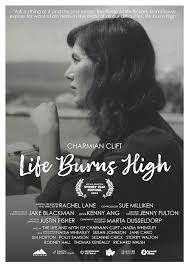
CHARMIAN CLIFT: LIFE BURNS HIGH
Australia, 2024, 80 minutes, Colour.
Voices: Marta Düsseldorp.
Directed by Rachel Lane.
Charmian Clift has a significant place in Australian literature. She published many books, a number in collaboration with her husband, George Johnston. She also wrote a significant column in Australian newspapers during the 1960s, stimulating ideas and discussions.
This documentary outlines the details of her life, her background, early career, marriage to George Johnston, family, their life in the UK, their life in the Greek islands, the return to Australia.
Underlying the narrative are many quotes from Charmian Clift’s writings, visually highlighted, as well as passages from her articles. These are voiced by veteran Australian actress, Marta Düsseldorp. And the film is able to use a great deal of footage from her movies, television interviews and programs, excerpts from the television series both 1965 and 2001 from the novel, My Brother Jack.
There are many commentators, their contributions to advantage in the film. A narrative is supplied by official biographer, Nadia Wheatley. There is significant commentary from poet Rodney Hall who spent time with his wife and family with Clift and Johnston. There is also commentary from novelist, Thomas Kenneally. There is vigorous comments from writer, Jane Caro. There is also material from the director of My Brother Jack and journalist Richard Walsh.
The film highlights the family growing up in Kiama the 1920s and 30s, military background of the family, Charmian and her education, her use of the military, writing for the military papers, catching the eye of a publisher from the Melbourne Argus, the success of her writing, the encounter with celebrated war correspondent, George Johnston, the affair, his separation from his wife, the couple marrying, moving to the UK, his successful career there, her pregnancies and looking after children, his office affair.
The two collaborated in their writing, then made the significant move to Greece, life in the island, support from a local businessman, increasing number of visitors, and artistic colony, the significant visit of Leonard Cohen and its influence on his relationship and future, many publications, the children growing up speaking and thinking in Greek, but many clashes, and Charmian having affairs.
With Johnston’s success, especially with My Brother Jack, the family returned to Australia. It was here that Charmian had great success and influence in Australia with her columns, in the women’s section of the papers, sponsored by Grace Bros, but increasingly read, discussed.
But, there were health difficulties, George, antibiotics, smoking, lung difficulties, collaboration with Charmian, but also fighting. Ultimately, George wrote Clean Straw for Nothing which, with its fictitious character based on his wife, is condemnatory of her, indicating that she was responsible for his health collapse. And, then, a depressed Charmian commits suicide.
The film is a portrait of Charmian, a lesser a portrait of George Johnston, but a visit to the Greek islands and their influence on the family, and the social change in unrest in Australia in the mid-1960s.